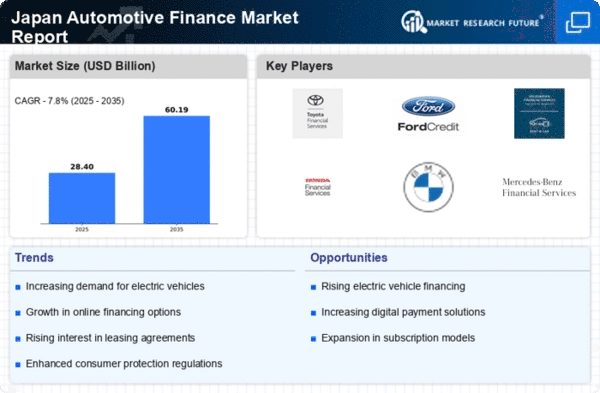Evolving Regulatory Landscape
The automotive finance market in Japan is influenced by an evolving regulatory landscape that aims to enhance consumer protection and promote fair lending practices. Recent regulations have introduced stricter guidelines for transparency in financing agreements, requiring lenders to disclose all terms and conditions clearly. As of 2025, compliance with these regulations is crucial for financial institutions to maintain their market position. This regulatory environment encourages competition among lenders, as they strive to offer more favorable terms to attract consumers. Additionally, the focus on responsible lending practices is likely to foster a more stable automotive finance market, as it mitigates risks associated with over-leveraging. Overall, the evolving regulatory framework is shaping the dynamics of the automotive finance market.
Rising Interest Rates and Their Impact
The automotive finance market in Japan is currently navigating the challenges posed by rising interest rates. As the Bank of Japan adjusts its monetary policy, the cost of borrowing is expected to increase, which may influence consumer behavior. Higher interest rates could lead to a decrease in loan approvals, as potential buyers may reconsider their financing options. In 2025, it is projected that the average interest rate for auto loans could rise to around 4%, impacting affordability for many consumers. This situation may compel financial institutions to innovate their offerings, such as introducing fixed-rate loans or flexible repayment plans, to maintain competitiveness in the automotive finance market. The overall effect of rising interest rates could reshape consumer financing strategies.
Shift Towards Electric and Hybrid Vehicles
The automotive finance market in Japan is witnessing a significant shift towards electric and hybrid vehicles, driven by government incentives and changing consumer preferences. As of 2025, electric vehicle sales are projected to account for approximately 30% of total vehicle sales in Japan, prompting financial institutions to adapt their financing products accordingly. This transition is supported by various subsidies and tax benefits aimed at promoting environmentally friendly vehicles. Consequently, lenders are increasingly offering specialized financing options for electric and hybrid vehicles, which may include lower interest rates or extended loan terms. This shift not only aligns with national sustainability goals but also presents new opportunities for growth within the automotive finance market.
Increasing Consumer Demand for Vehicle Ownership
The automotive finance market in Japan is experiencing a notable surge in consumer demand for vehicle ownership. This trend is driven by a growing middle class and an increasing preference for personal mobility solutions. As of 2025, approximately 70% of Japanese households own at least one vehicle, indicating a strong inclination towards car ownership. This demand is further fueled by the desire for convenience and independence, particularly in urban areas where public transportation may not suffice. Consequently, financial institutions are adapting their offerings to cater to this demand, providing tailored financing solutions that appeal to a diverse consumer base. The automotive finance market is thus likely to see an increase in loan approvals and financing options, enhancing accessibility for potential buyers.
Technological Advancements in Financing Processes
Technological innovations are reshaping the automotive finance market in Japan, streamlining financing processes and enhancing customer experiences. The integration of artificial intelligence and machine learning in credit assessment is becoming increasingly prevalent, allowing lenders to evaluate applications more efficiently. As of 2025, it is estimated that over 60% of financing applications are processed digitally, reducing turnaround times significantly. Additionally, mobile applications are facilitating easier access to financing options, enabling consumers to compare rates and terms conveniently. This technological shift not only improves operational efficiency for financial institutions but also empowers consumers with more information, potentially leading to better financing decisions. The automotive finance market is thus evolving rapidly, driven by these advancements.
















Leave a Comment